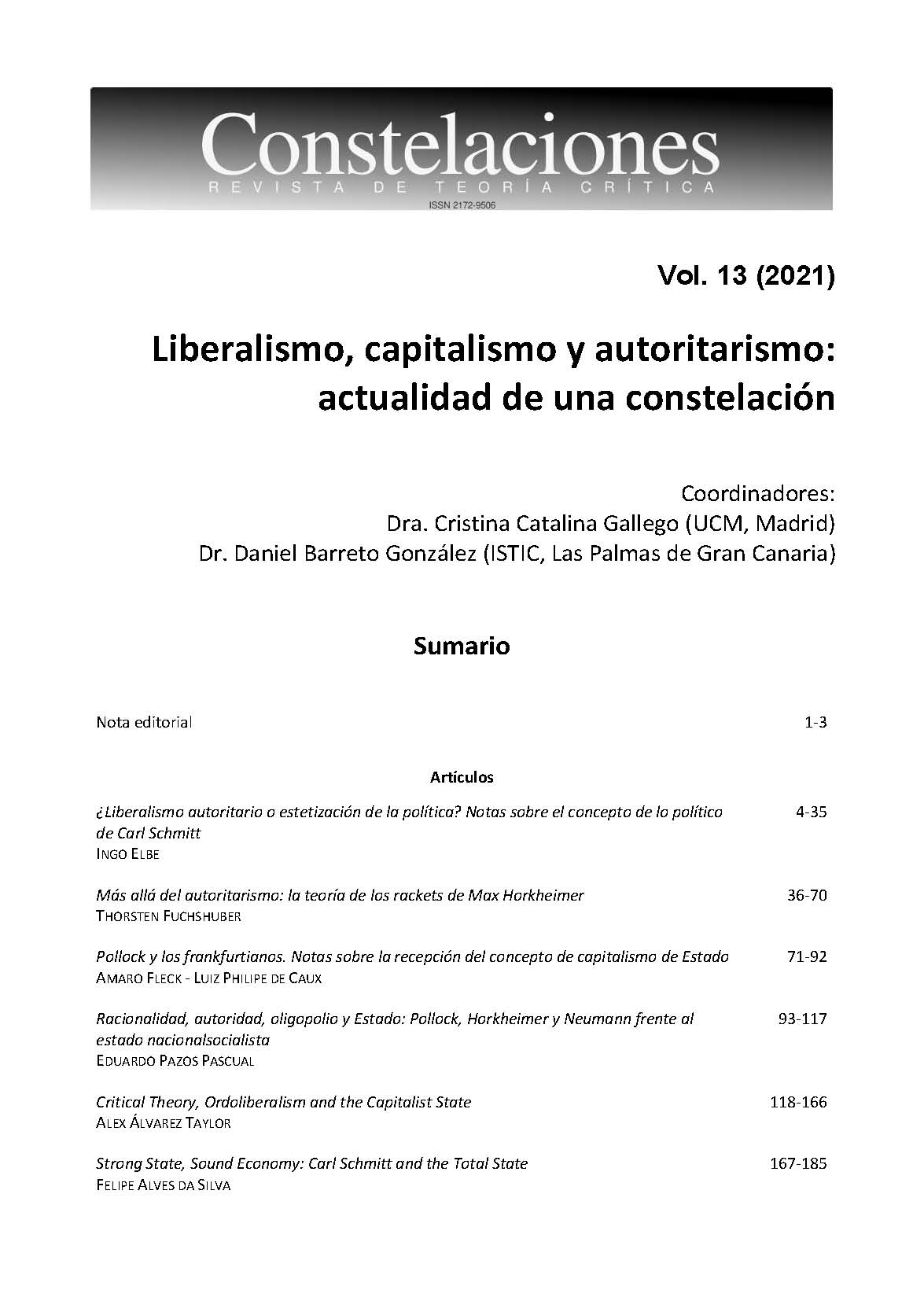Strong State, Sound Economy: Carl Schmitt and the Total State
Palavras-chave:
totalitarian theory, liberal theory, fascismResumo
Carl Schmitt’s concept of “total state” was formulated to describe the liberal state of the Weimar Republic that intervenes in all spheres of human life, overcoming the division between state and society. It is a total state by weakness since it is unable to curb social demands and to face the pluralism of interests of the political parties, which is followed by the subsequent bet on a real total state, called qualitative, thinking along the lines of the Italian fascist state: only a qualitative total state would be able to depoliticize society, overriding the interests of groups that seek to control the state, as a result, with non-intervention in the economy. Marcuse’s way to deal with this concept, using the term total-authoritarian state in reference to the qualitative total state, helps us comprehend the intimate relation between fascism and liberalism.
Downloads
Referências
BONEFELD, Werner (2016): Authoritarian Liberalism: from Schmitt via Ordoliberalism to the Euro, Critical Sociology, June 2016.
BONEFELD, Werner (2017a): Ordoliberalism and Political Theology: On the Government of Stateless Money. In: HIEN, J., JOERGES, C. (Eds.). Ordoliberalism, Law and the Rule of Economics, Portland, Hart Publishing.
BONEFELD, Werner (2017b): The Strong State and the Free Economy, London e New York, Rowman & Littlefield.
CHAMAYOU, Grégoire (2020): A sociedade ingovernável: uma genealogia do liberalismo autoritário, São Paulo, UBU.
CRISTI, Renato (1998): Carl Schmitt and Authoritarian Liberalism. Strong State, Free Economy, Cardiff, University of Wales Press.
HELLER, Hermann (2015): Authoritarian Liberalism? European Law Journal, v. 21, n. 3, may.
MARCUSE, Herbert (1965): Repressive Tolerance. In: WOLFF, Robert Paul; MOORE, Barrington; MARCUSE, Herbert. A Critique of Pure Tolerance, Boston, Beacon Press.
MARCUSE, Herbert (2009): The struggle against liberalism in the totalitarian view of the state. In: Negations, London, MayFlyBooks.
SAFATLE, Vladimir (2019): Dar corpo ao impossível: o sentido da dialética a partir de Theodor Adorno, Belo Horizonte, Autêntica.
SCHEUERMAN, William E. (1999): Carl Schmitt: the end of law, Maryland, Rowman & Littlefield.
SCHMITT, Carl (1940a): Die Wendung zum totalen Staat [1931]. In: Positionen und Begriffe im Kampf mit Weimar-Genf-Versailles (1923-1939), Hamburg, Hanseatische Verlagsanstalt Aktiengesellschaft.
SCHMITT, Carl (1940b): Weiterentwicklung des totalen Staats in Deutschland [1933]. In: Positionen und Begriffe im Kampf mit Weimar-Genf-Versailles (1923-1939), Hamburg, Hanseatische Verlagsanstalt Aktiengesellschaft.
SCHMITT, Carl (1979). Politische Theologie. Vier Kapitel zur Lehre von der Souveränität. Duncker & Humblot: Berlin.
SCHMITT, Carl (1985): Vorbemerkung. Über den Gegensatz von Parlamentarismus und Demokratie. In: Die geistesgeschichtliche Lage des heutigen Parlamentarismus, 6. Aufl., Berlin, Duncker und Humblot.
SCHMITT, Carl (1998): Strong state and sound economy: an address to business leaders. In: CRISTI, Renato, Carl Schmitt and Authoritarian Liberalism. Strong State, Free Economy, Cardiff, University of Wales Press.
VILLACAÑAS, José L. (2008): Poder y conflicto. Estudios sobre Carl Schmitt, Madrid, Biblioteca Nueva.
WOLIN, Richard (2006): The disoriented left: a critique of left schmittianism. In: The Frankfurt School Revisited: and other essays on politics and society, New York, Routledge.
Downloads
Publicado
Como Citar
Edição
Secção
Licença
Direitos de Autor (c) 2021 Felipe Alves da Silva

Este trabalho encontra-se publicado com a Licença Internacional Creative Commons Atribuição-NãoComercial-CompartilhaIgual 4.0.
Aquellos autores/as que tengan publicaciones con esta revista, aceptan los términos siguientes:
1. Los autores/as conservarán sus derechos de autor y garantizarán a la revista el derecho de primera publicación de su obra, el cuál estará simultáneamente sujeto a la Licencia de reconocimiento de Creative Commons que permite a terceros compartir la obra siempre que se indique su autor y su primera publicación esta revista.
2. Los autores/as podrán adoptar otros acuerdos de licencia no exclusiva de distribución de la versión de la obra publicada (p. ej.: depositarla en un archivo telemático institucional o publicarla en un volumen monográfico) siempre que se indique la publicación inicial en esta revista.
3. Se permite y recomienda a los autores/as difundir su obra a través de Internet (p. ej.: en archivos telemáticos institucionales o en su página web) antes y durante el proceso de envío, lo cual puede producir intercambios interesantes y aumentar las citas de la obra publicada. (Véase El efecto del acceso abierto).
Confidencialidad de los datos
1. Constelaciones. Revista de Teoría Crítica garantiza que los datos que nos envíe serán utilizados únicamente para atender sus demandas manifestadas en este mensaje.
2. Sus datos no serán cedidos a terceros.
3. Cuando lo desee puede solicitar que sus datos sean eliminados de nuestros registros.





